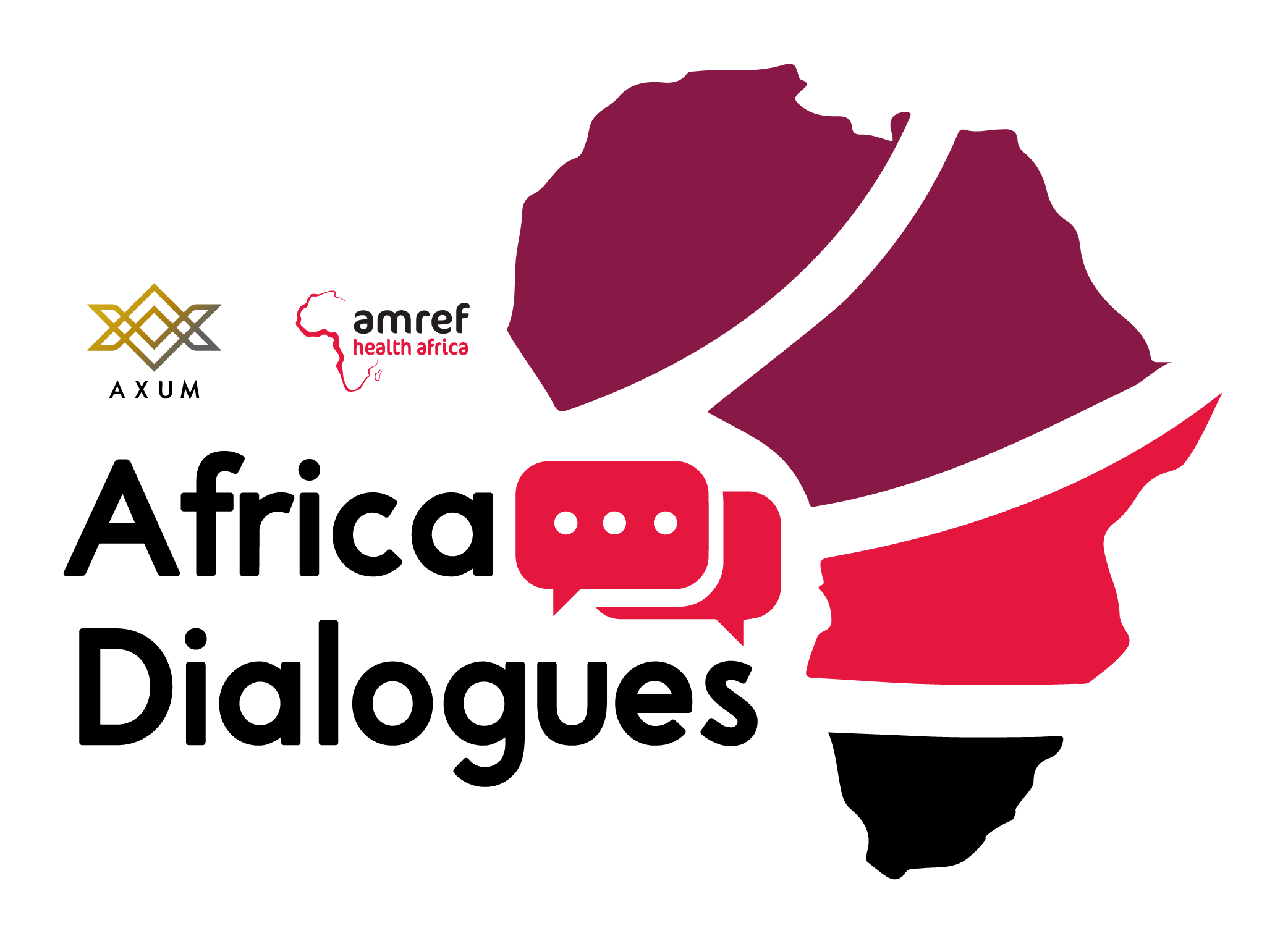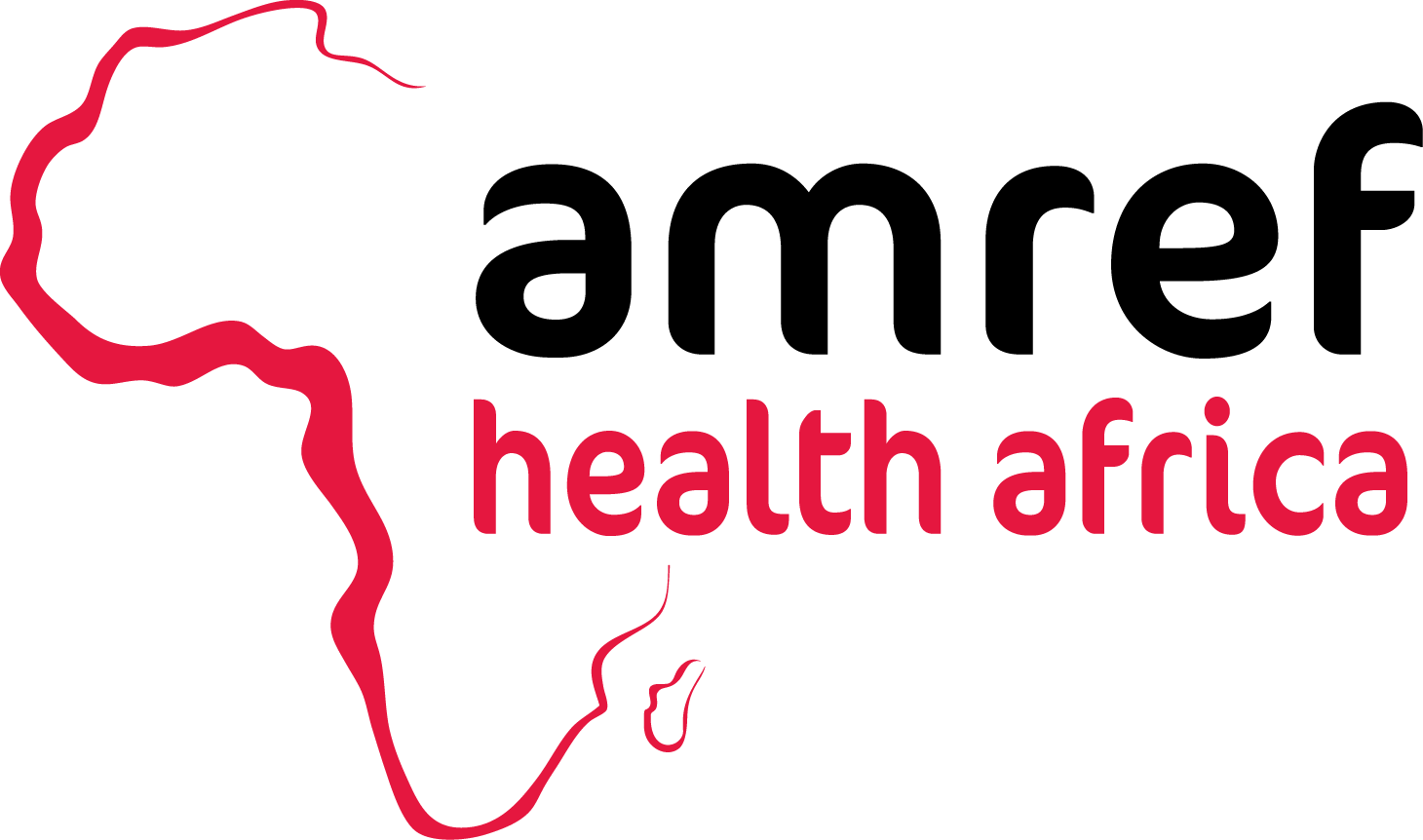Past Webinars
Recordings of past webinars to catch up on valuable information you missed the first time around.

Harnessing the Power of Local Communities and Youth for Climate Action in Africa
We are delighted to invite you to our webinar that aims to shed light on the vital role local communities, including young people are playing in shaping climate action for health across the African continent. Climate change is a health crisis – it poses one of the most significant threats to global health, and urgent collective action is needed to tackle the challenge. To find solutions, we must involve diverse perspectives, and elevate some of the voices that are often ignored but are worst affected by impacts of climate change in Africa.
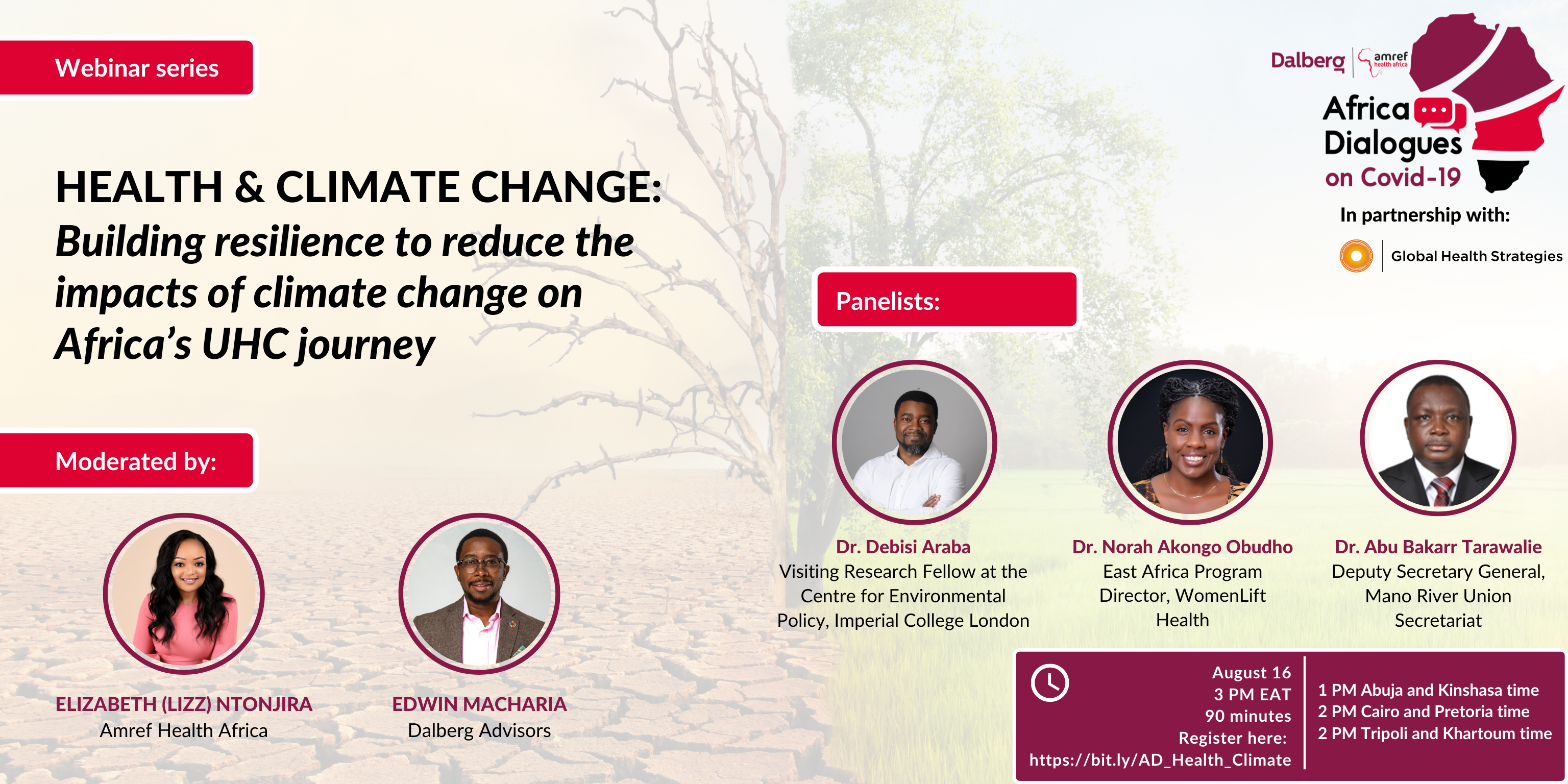
Health & Climate Change: Building Resilience to Reduce the Impacts of Climate Change on Africa’s UHC Journey
Droughts in Eastern Africa, floods in Southern Africa and rising temperatures in Northern Africa; climate change has been identified as the single biggest health threat facing humanity. Despite Africa accounting for only 2-3% of global emissions, the repercussions of climate change are disproportionally affecting health outcomes across the continent, especially among vulnerable populations. The World Health Organization (WHO) reported that 56% of the 2,121 public health events recorded in the African region in the past 20 years were linked to climate change.
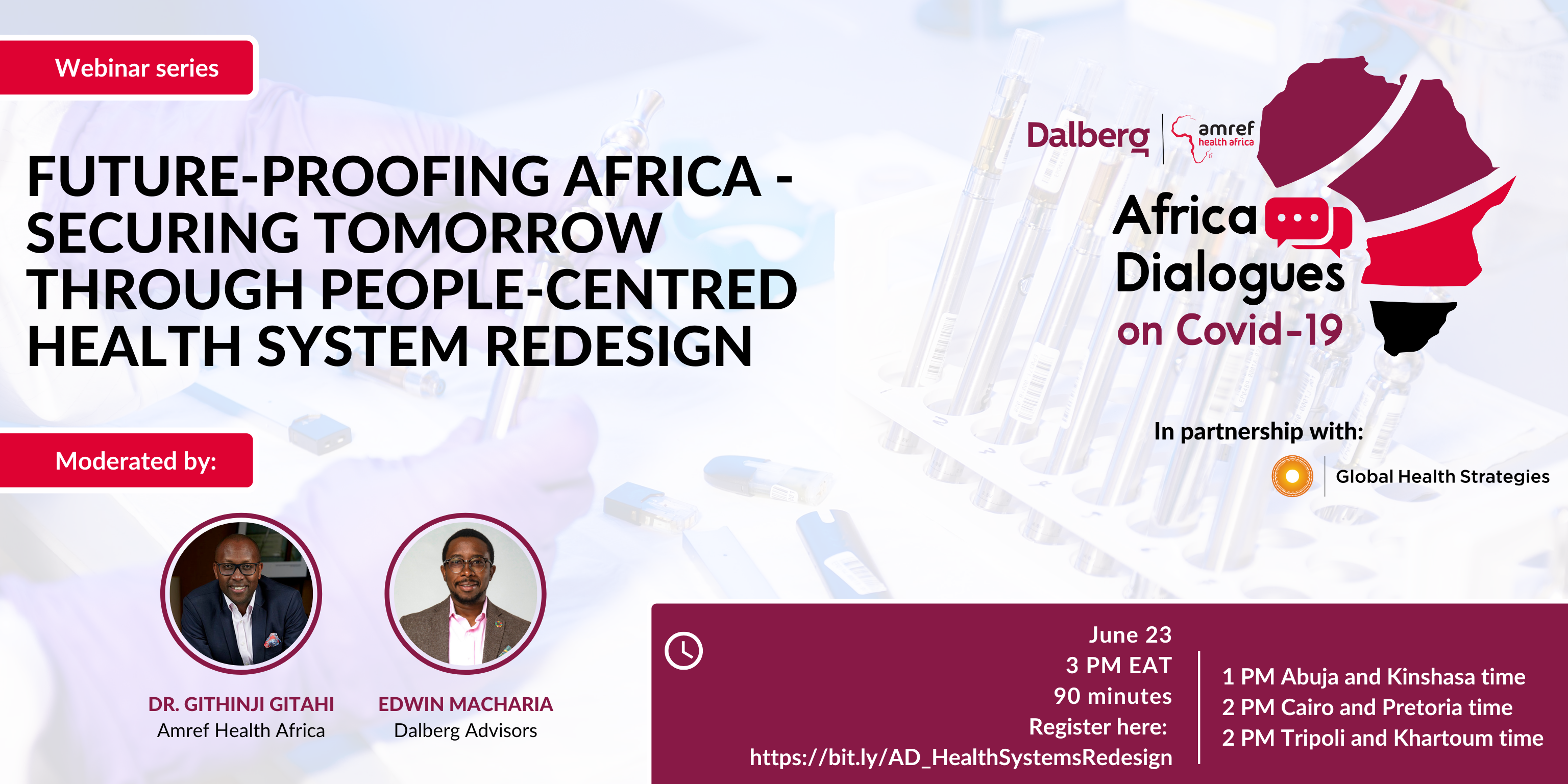
Future-proofing Africa - Securing Tomorrow Through People-Centred Health System Redesign
A continental health procurement policy, health being a whole society issue and integrated health systems were among the topics discussed at the interactive session. The webinar served as an opportunity to hear from health policy experts about the human-centred health strategies Africa needs to implement to transform its health systems, so they are sustainable and crisis-ready. Participants joined from over a dozen countries and weighed in with questions, comments and reflections, keeping speakers and moderators on their toes. Kicking off the session, co-moderator and Amref Health Africa CEO Dr Gitijini Gitahi highlighted the incongruity between Africa’s high disease burden and the fragility and unaffordability of the continent’s health systems.
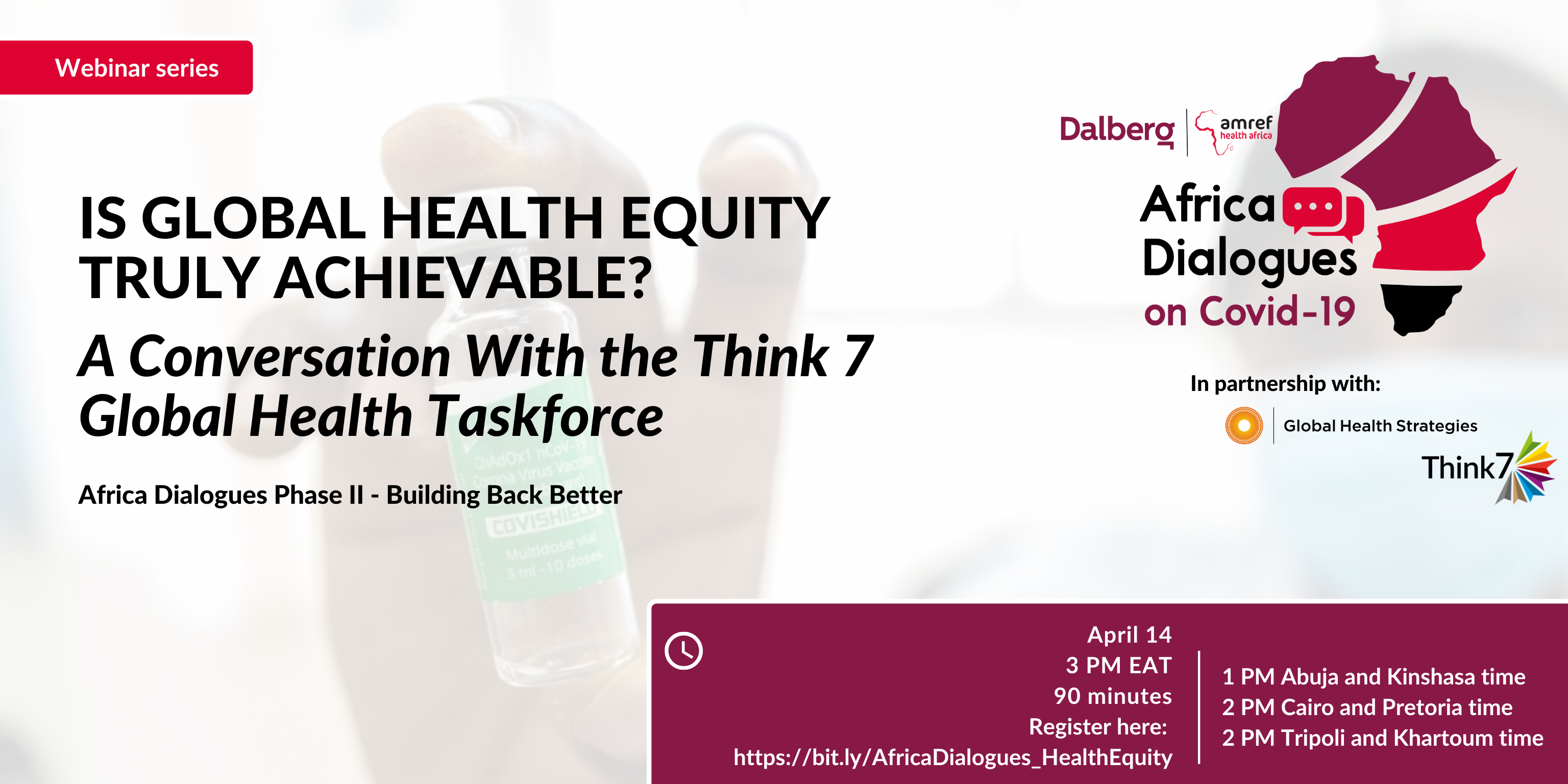
Is Global Health Equity Truly Achievable? A Conversation with the Think 7 Global Health Task Force
This edition of the Africa Dialogue webinar brings together T7 Global Health Task Force experts, G20 representatives, and thought leaders for a discussion on the urgent topics requiring political commitment and action from African leaders and the international community—particularly the G7 nations with their ability to leverage resources and power.
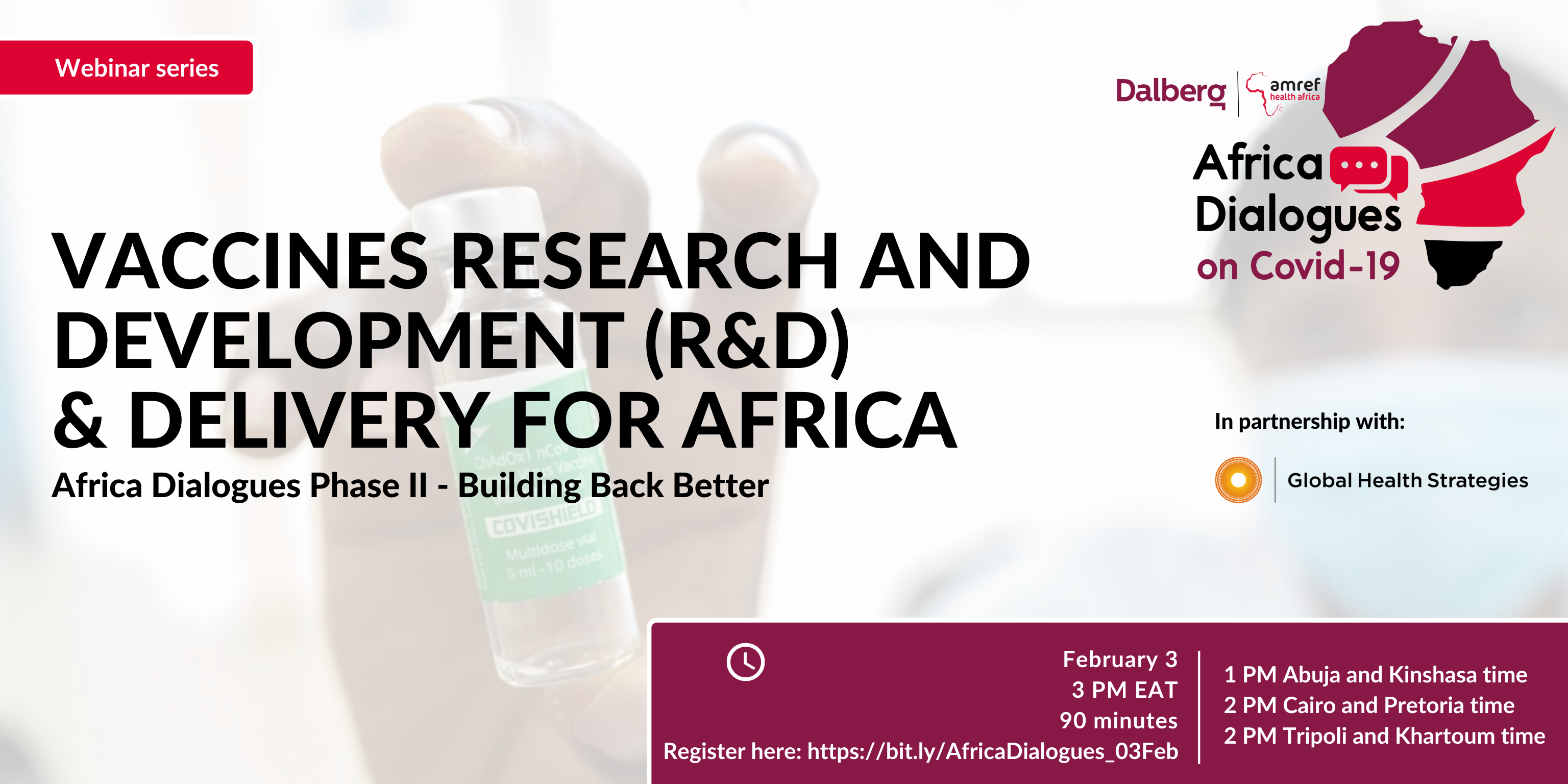
Vaccines Research and Development (R&D) and Delivery for Africa
This webinar brought together African leaders and opinion shapers to discuss ongoing efforts to bolster Africa’s research and development (R&D) capacity. The dialogue focused on multi-stakeholder action towards building capacity for vaccine development, production, and distribution, opportunities for regional collaboration, and solutions to barriers such as financing, vaccine hesitancy, and access to licenses and technology.
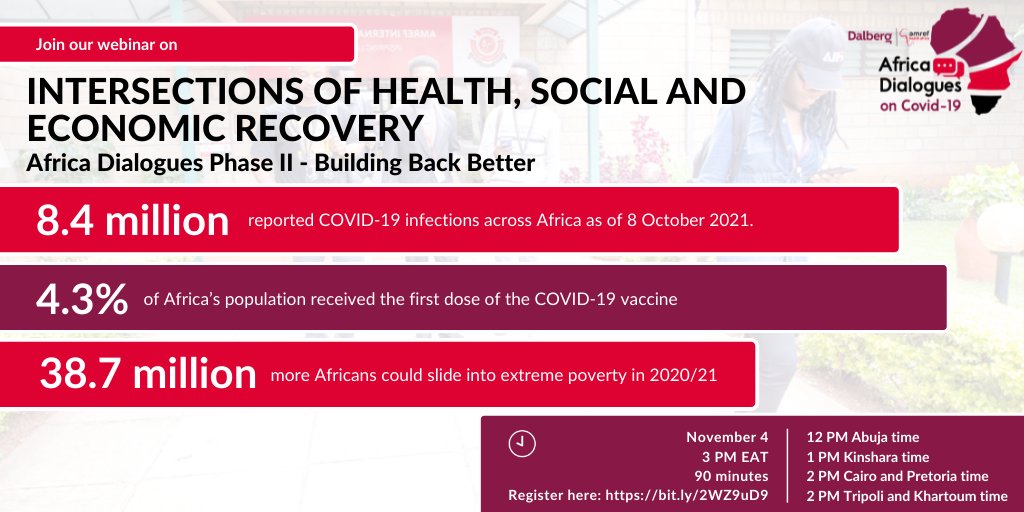
Intersections of Health, Social and Economic Recovery
The webinar focuses on crucial lessons we have had to learn on the intersection between health, policy and governance, social development and economic growth, and their implications on the continent’s growth and development in the coming years. Amref Health Africa and Dalberg Advisors in partnership with Global Health Strategies will host Dr. Ama Pokuaa Fenny (PhD Senior Research Fellow at the University of Ghana), Dr. Ayoade (Yodi) Olatunbosun-Alakija (Co-Chair, African Union) and Prof. Olive Shisana (Special Advisor to President of South Africa) in a panel moderated by Edwin Macharia,Global Managing Partner of Dalberg Advisors and Githinji Gitahi, Global Chief Executive Officer of Amref Africa
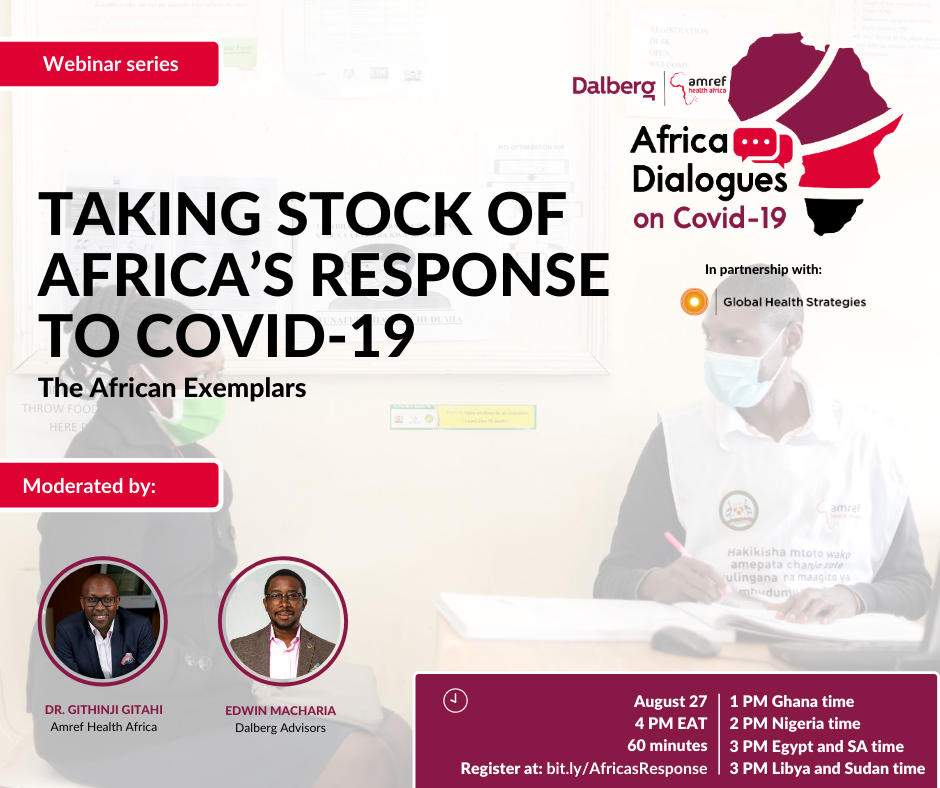
Preparing African Countries for the COVID-19 Vaccine
At the recent Africa Dialogues on COVID-19 webinar, Dalberg Advisors and Amref Health Africa in partnership with PATH and the Gavi SCO Steering Commitee hosted Dr. Richard Mihigo (Programme Manager for Vaccine Preventable Diseases, WHO AFRO), Dr. Emmanuel Mugisha (Uganda Country Director, PATH), Ms. Margaret Kilonzo (community health worker and community leader) and Dr. Chizoba Wonodi (Vice Chair, Gavi CSO Steering Committee; Nigeria Country Director, International Vaccine Access Center (IVAC), Johns Hopkins University) who shared their perspectives on the anticipated vaccine rollout, key considerations to ensure country readiness, and the need for equitable access.
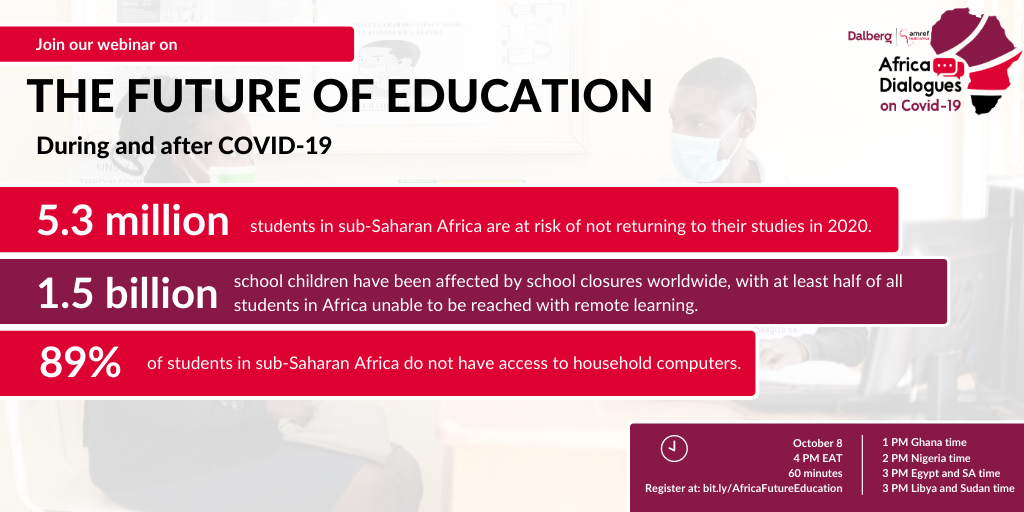
The Future of Education - during and after COVID-19
At the recent Africa Dialogues on COVID-19 webinar, Dalberg Advisors, Amref Health Africa and 8B Education Investments hosted Prof. Aiah Gbakima (Minister of Technical and Higher Education, Sierra Leone), Dr. James Mwangi (Group Managing Director and CEO, Equity Group Holdings Plc.), Uzodinma Iweala (CEO, The Africa Center) and Amini Kajunju (Executive Director, IUGB Foundation) to discuss the implications of the disruption in education for African youth due to COVID-19 and what must be done to address these implications, both during and after the pandemic.As the war on COVID-19 continues, Exemplars in Global Health (EGH), led by Gates Ventures, organised a convening of research partners to analyse the critical elements of successful, country-level epidemic preparedness and response strategies against COVID-19. Following this convening, the EGH platform was publicly launched in June 2020. The platform aims to highlight a number of African countries that have successfully responded to COVID-19 and are well-positioned to support national leaders and public health decision-makers emulate effective methods and processes.
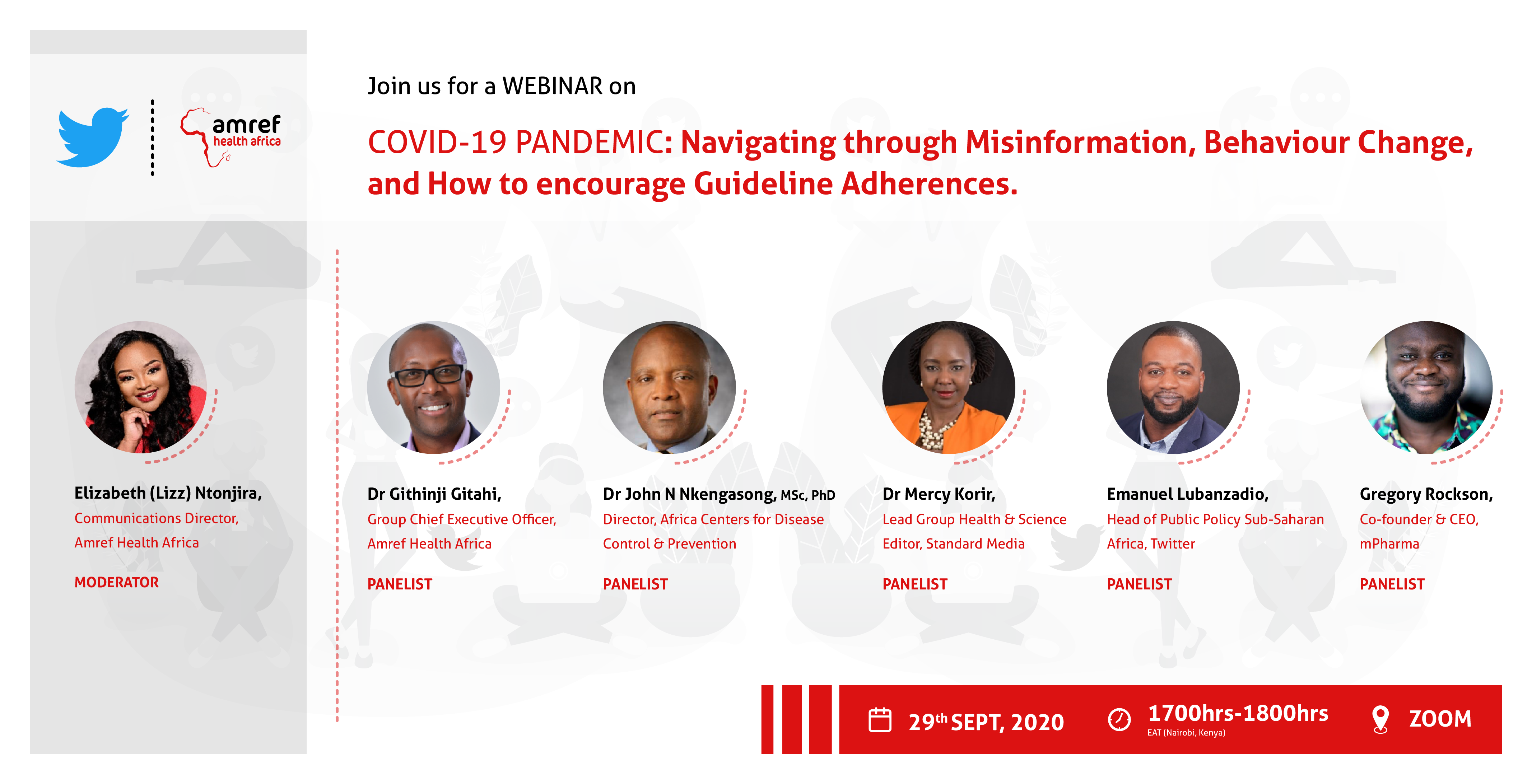
COVID-19 and its challenges: Navigating through COVID-19 and its challenges: Misinformation, Behaviour Change, & How to encourage Guideline Adherences.
This webinar, in partnership with Twitter, brought together health technical experts and communication specialists to deliberate around specific issues related to COVID-19 & Vaccines misinformation and guideline adherence. The webinar featured Dr. John Nkengason, Director at Africa CDC; Dr. Githinji Gitahi, Group CEO at Amref Health Africa; Emmanuel Lubanzadio, Head of Public Policy in Sub Sahara Africa at Twitter; Gregory Rockson, Co-founder and CEO of mPharma; Dr. Mercy Korir, Lead Group Health and Sciences editor at Standard media and was moderated by Lizz Ntonjira, the Communication Director at Amref Health Africa. The discussion shed light on what challenges disinformation, misinformation, guideline adherence as well as their feasibility has brought about within the African continent and how Entrepreneurs, Social Media platforms, the Media and the government can collaborate in enhancing public health efforts to contain the pandemic. The webinar also highlighted various efforts and initiatives that are being used to help users navigate through information online and finding credible sources and how for instance, technology companies like Twitter support users. As the war on COVID-19 continues, Exemplars in Global Health (EGH), led by Gates Ventures, organised a convening of research partners to analyse the critical elements of successful, country-level epidemic preparedness and response strategies against COVID-19. Following this convening, the EGH platform was publicly launched in June 2020. The platform aims to highlight a number of African countries that have successfully responded to COVID-19 and are well-positioned to support national leaders and public health decision-makers emulate effective methods and processes.

Taking stock of Africa’s response to COVID-19: The African Exemplars
At the onset of the COVID-19 outbreak, many global health experts predicted that Africa would be disproportionately affected due to the relatively weak health infrastructure in many of its countries. Despite these projections, the rise of cases has come much later than anticipated, allowing the continent to prepare by applying lessons learnt from previous health crises. As the war on COVID-19 continues, Exemplars in Global Health (EGH), led by Gates Ventures, organised a convening of research partners to analyse the critical elements of successful, country-level epidemic preparedness and response strategies against COVID-19. Following this convening, the EGH platform was publicly launched in June 2020. The platform aims to highlight a number of African countries that have successfully responded to COVID-19 and are well-positioned to support national leaders and public health decision-makers emulate effective methods and processes.

The evolving role of tech during the COVID-19 pandemic
The role of tech in education, health, e-commerce and other sectors has been crucial during lockdowns around the world. The COVID-19 crisis is likely to accelerate the use of digital technologies in many spheres of our life. Although the full extent of the COVID-19 pandemic is not yet known, it has already become a catalyst for change and innovation. This will bring new opportunities but also challenges and risks on a global scale. At the recent Africa Dialogues on COVID-19 webinar, Dalberg Advisors and Amref Health Africa hosted Nitin Gajria (Director for Sub-Saharan Africa, Google), Nanjira Sambuli (Researcher, Policy Analyst, Advocacy Strategist), Alastair Sussock (Co-Founder & Co-CEO, SafeBoda), and Dr Cathy Mwangi PhD (Founder & CEO, mHealth Kenya) to share insights on the evolving role of tech during the pandemic.
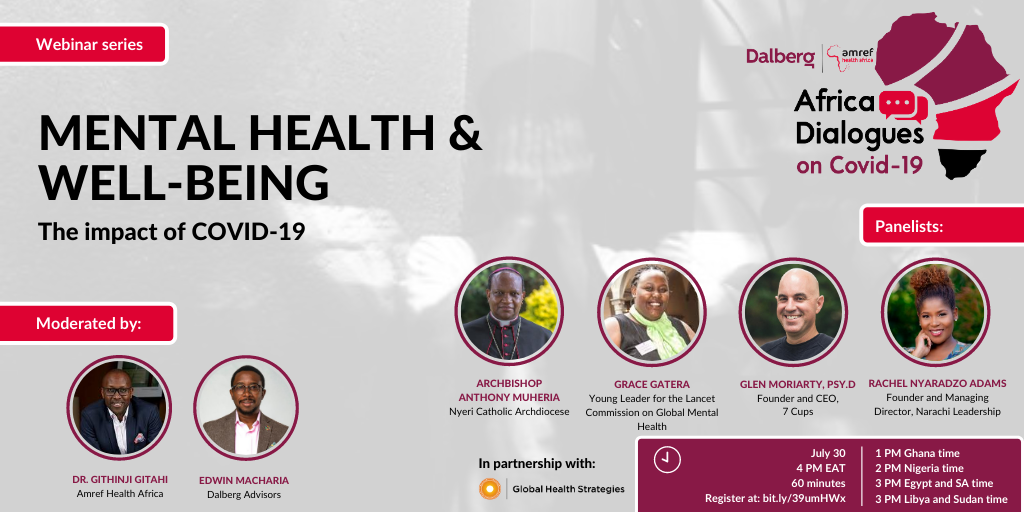
The impact of COVID-19 on mental health and wellbeing
Mental health is an essential and fundamental component of health. It is not only the foundation for thinking, communication, learning, resilience, and self-esteem, but also the key to personal wellbeing and relationships. Good mental health is also a critical component of the overall functioning of society, even during periods of stability and prosperity. However, due to the COVID-19 pandemic, the mental health and well-being of whole societies has been severely impacted. The upcoming Africa Dialogues webinar on 30 July will focus on the impact of COVID-19 on mental health and well-being. Dalberg Advisors and Amref Health Africa will host Grace Gatera (Young Leader for the Lancet Commission on Global Mental Health), Glen Moriarty (Founder and CEO of 7 Cups), Rachel Nyaradzo Adams (Founder and Managing Director of Narachi Leadership), and Archbishop Anthony Muheria (Nyeri Catholic Archdiocese) to share their insights on the effects of COVID-19 on mental health, how governments are responding, and why access to quality mental health support services are needed now more than ever.The guest speakers provided their perspectives on access to basic primary health care, maternal and child health services as well as essential immunization services; care for chronic disease patients; support for palliative care and access to emergency health services.

Youth policies and programming: Evidence and considerations
Dalberg Advisors and Amref Health Africa hosted Ms. Irene Siaw (Youth Country Coordinator, Ghana SRHR Alliance for Young People), Mr. Benard Karanja (Co-founder of Tiba-vent mechanical ventilator, President of Kenyatta University Students Association, and Federation of Africa Medical Students Association member), Dr. Dario Abdula Camal (Youth Advisory Council of African Union Commission, multiple award winning young Pan-Africanist) and Ms. Lilies Njanga (Manager, Strategic Engagement & Communications, Children’s Investment Fund Foundation) to share their insights on the effects of COVID-19 on youth and the youth-driven solutions in response to the pandemic. The guest speakers provided their perspectives on access to basic primary health care, maternal and child health services as well as essential immunization services; care for chronic disease patients; support for palliative care and access to emergency health services.
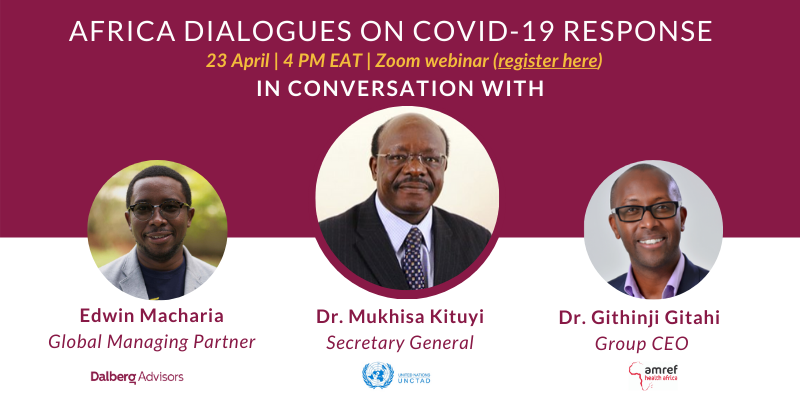
Preparedness for Economic Recovery
As the pandemic advances across Africa, its devastating effects are evolving; the health crisis has evolved into an economic crisis. The World Bank projects that economic growth in Sub-Saharan Africa will decline from 2.4% in 2019 to -2.1% to -5.1% in 2020, the first recession in the region in 25 years. Dalberg Advisors and Amref Health Africa will host Dr. Mukhisa Kituyi, Secretary General of the United Nations Conference on Trade and Development (UNCTAD) to share his perspective on what to expect in terms of the economic impact of COVID-19 and how the continent can prepare to rebuild its economy after the pandemic.
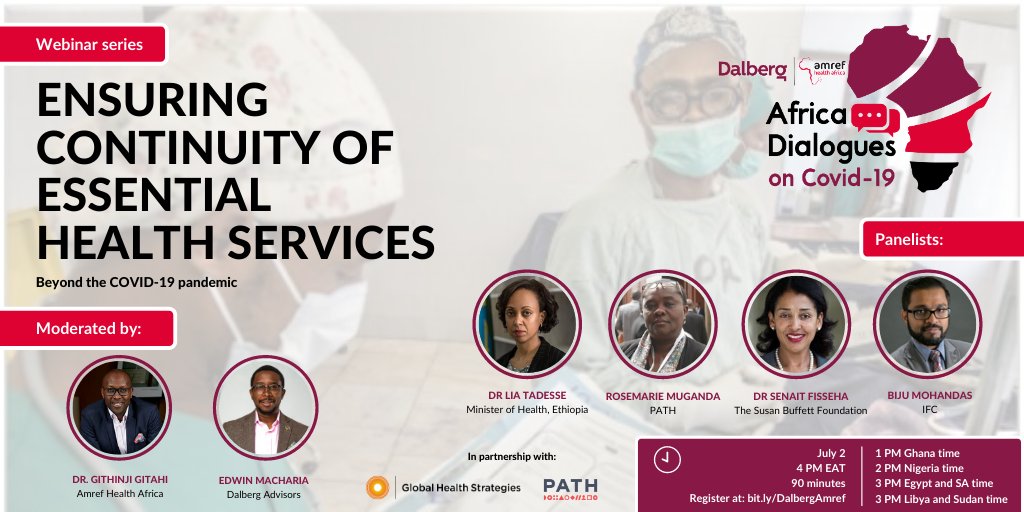
Africa Dialogues on delivery of essential health services
Dalberg Advisors, Amref Health Africa and PATH hosted Dr. Lia Tadesse, Minister of Health Ethiopia, Rosemarie Muganda, Regional Advocacy Director for Africa at PATH, Biju Mohandas, Head of Health and Education in Sub-Saharan Africa at IFC, and Dr. Senait Fisseha, Director of International Programs at the Buffett Foundation, as well as John Mbene, Community Health worker in Malawi and Christine Mundambu, Community Health worker in Zambia to share their insights on the topic of Ensuring continuity of essential health services beyond the COVID-19 pandemic. The guest speakers provided their perspectives on access to basic primary health care, maternal and child health services as well as essential immunization services; care for chronic disease patients; support for palliative care and access to emergency health services.

Africa Dialogues on Re-opening African Economies
Dalberg Advisors and Amref Health Africa hosted Clare Akamanzi (Chief Executive Officer, Rwanda Development Board & Cabinet Member), Dr. Miriam Altman (Director of Altman Advisory), Dr. Hillary Kipruto (Technical Officer, Health information and Knowledge Management, WHO Regional Office for Africa) and Dr. Humphrey Karamagi (Team Leader, Data, Analytics and Delivery for Impact, WHO Regional Office for Africa), to share their perspectives on the topic Re-opening African Economies while balancing public health measures. The guest speakers shared their perspective on which models would be safest to use when opening African economies up, how the continent could work together on the re-opening, how to balance public health and economic consequences, as well as how the international community might best support African countries.
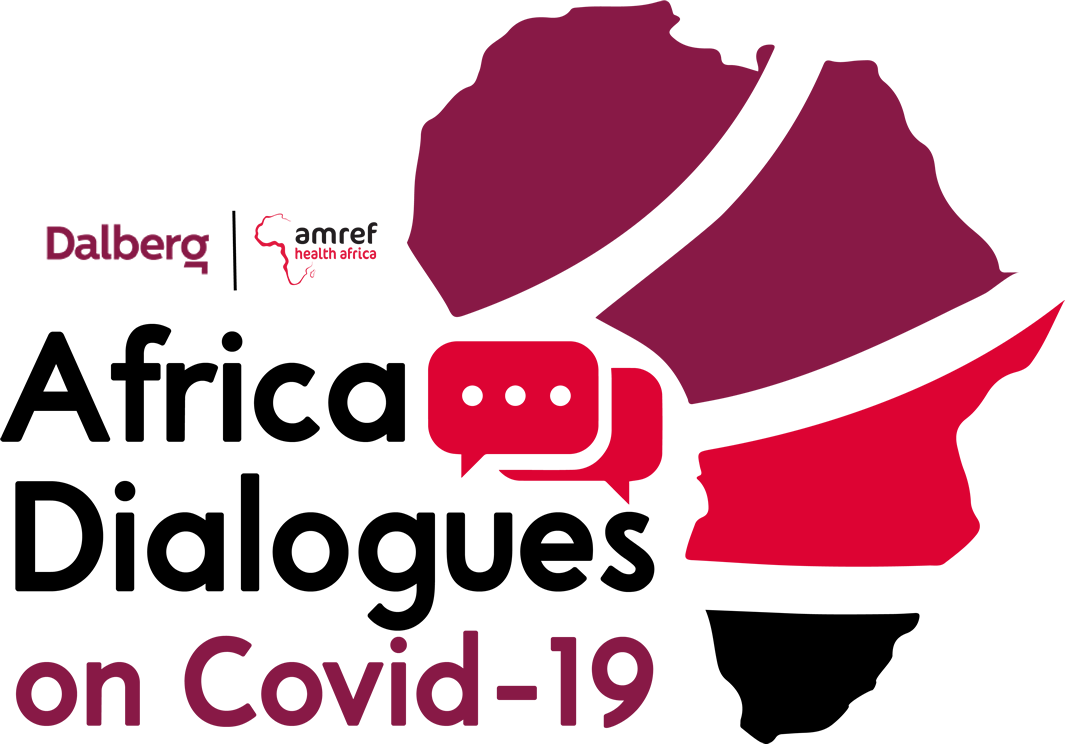
Gendered Impacts of COVID-19
Dalberg Advisors and Amref Health Africa hosted Dr. Angela Muriithi (Country Director, Plan International Zimbabwe), Dr. Boluwatife Oluwafunmilola Lola-Dare (President, CHESTRAD Global), Scheaffer Okore (Advisory Board Member, Gates Foundation Goalkeepers) and Dr. Solange Hakiba (UHC and Health Equity Advocate), to share their perspectives on gendered impacts of COVID-19. The guest speakers discussed challenges that the pandemic presents to health policy on gender, government engagement on gender inclusion, gender equity markers for programme planning and implementation, and how to ensure minimal disruption of services to women and girls during the pandemic.
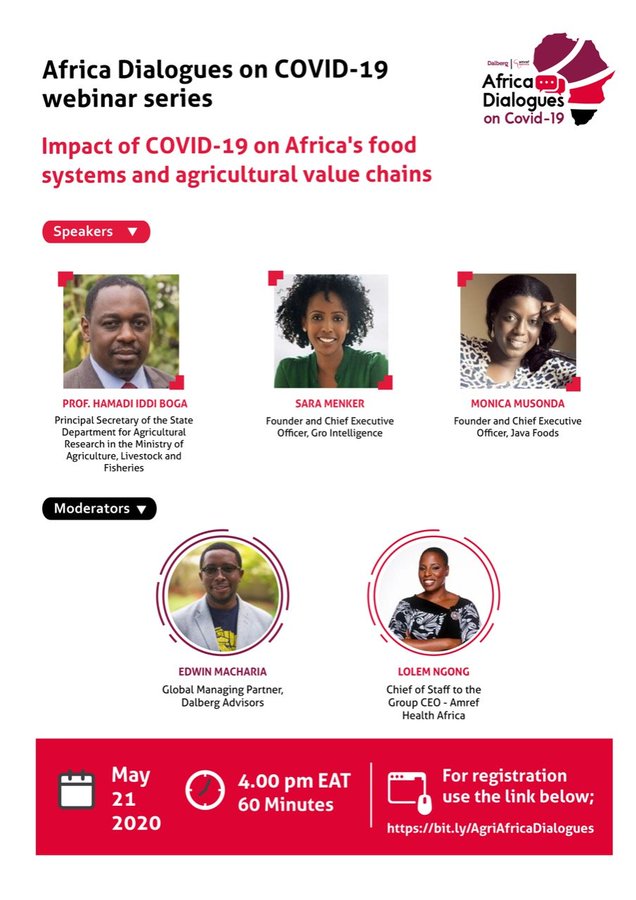
Impact of COVID-19 on Africa's Food Security
Dalberg Advisors and Amref Health Africa hosted Professor Hamadi Iddi Boga (Principal Secretary, Ministry of Agriculture, Livestock and Fisheries), Sara Menker (Founder and Chief Executive Officer of Gro Intelligence) and Monica Musonda (Founder and Chief Executive Officer of Java Foods), to share their perspectives on how the COVID-19 pandemic is disrupting Africa's agricultural production and supply chains. The guest speakers discussed how to mitigate disruptions in food supply, COVID-19's impact on small-scale farming and food security for vulnerable populations, and whether the pandemic could change how people think about food and diet.
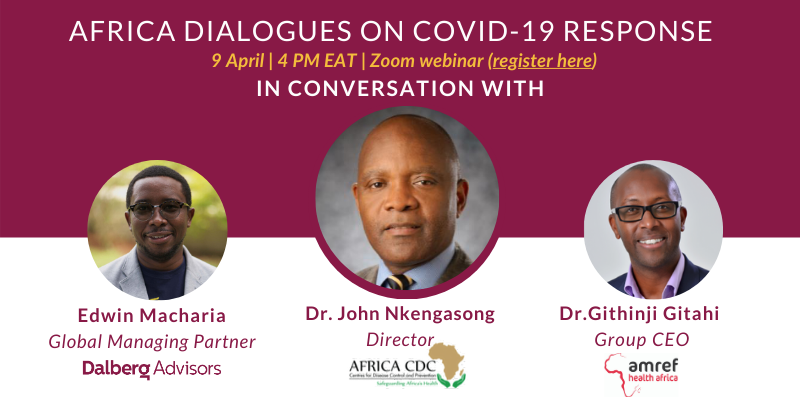
Africa Dialogues on COVID-19 Response - In Conversation with Africa CDC
Given the state of health systems in Africa, the different stages of epidemic onset, the existence of large informal settlements, poor disease surveillance, among other challenges, a continental strategy is critical to the success of Africa’s response to the COVID-19 pandemic. A continental response enhances disease surveillance and availability of real-time data to inform decision making, facilitates a more efficient use of supply chain systems, maximizes resources and drives political commitment.
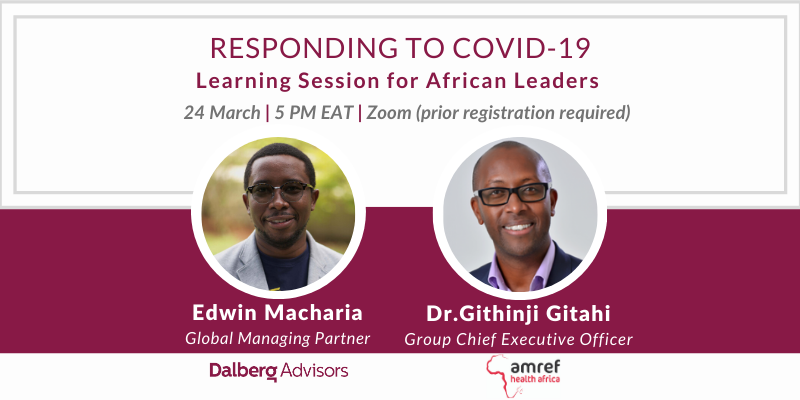
Responding to COVID-19: Learning Session for African Leaders
The evolving COVID-19 pandemic compels leaders around the world to innovate and harness tools for addressing such crises while mitigating disruptions. Our response as leaders demands that we are intentional about occupational safety and health, as well as the socio-economic challenges posed by the pandemic in Africa.
